
Veteran Voices: The Oral History Podcast
The Social Voice Project, Inc.
Conversations with veterans oral historians and storytellers.
- 42 minutes 47 secondsVeteran Voices Podcast (Ep 44): James Van Keuren
Veteran Voices Podcast (Ep 44): James Van Keuren
<h2 style="text-align: center;">The School Poisoning Tragedy in Caledonia, Ohio </h2>
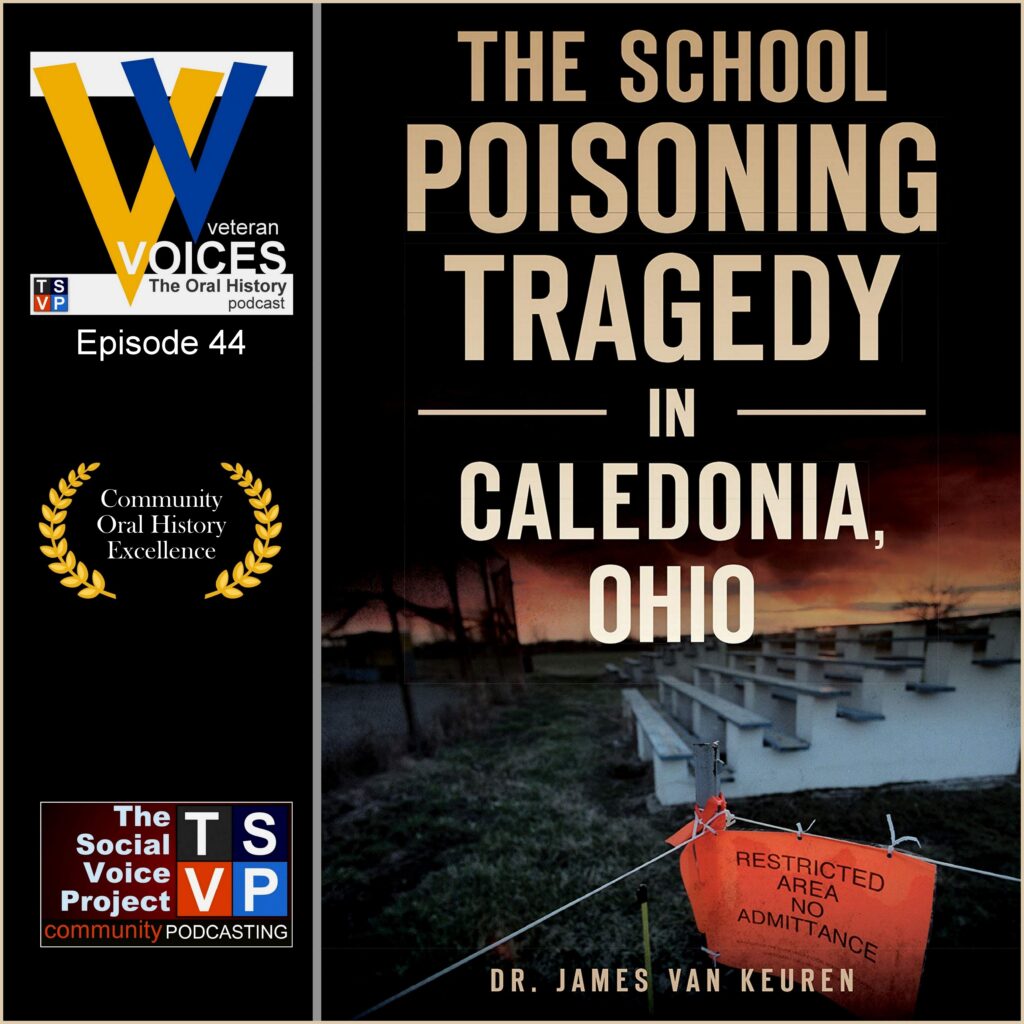
ABOUT THIS EPISODE
On episode 44 of Veteran Voices: The Oral History Podcast, we talk with James Van Keuren about his book, The School Poisoning Tragedy in Caledonia, Ohio, and the tragic but little known story of what a small community in Ohio went through in the years and decades after WWII.
We’ve always understood the veteran experience in broadest terms that include the full range of issues veterans, their families, and our communities go through before, during, and after military service. Some of these issues are well known, such as post traumatic disorders or military-related illnesses known as Agent Orange, Gulf War Syndrome, or the most recent toxic burn pit exposures. Also fitting into these experiences are the social, political, and economic consequences communities endure as a result of exposures to dangerous military-industrial activities abroad and at home.Dr. James Van Keuren’s book tells the tragic but little known story of what a small community in Ohio went through in the years and decades after WWII: “In the early 1960s, the River Valley Local School District built its middle school, its high school and its athletic fields in the former Marion Engineer Depot. During World War II, the depot had used the land for heavy equipment rehab, military artillery practice, materials storage, burial of construction debris and burning of waste materials and fuels.
“In 1997, a River Valley High School nurse grew concerned about the high rate of leukemia and other cancers in graduates. Then a stunning news report announcing a 122 percent increase in death rates over thirty years in the Marion area sparked an investigation.
“Was the land to blame? The question of what may have been known about the contaminates on the school grounds sent shock waves through the community that still linger today.”
Meanwhile, be sure to check out another conversation with Dr. Van Keuren discussing WWII POW camps in Ohio on episode 43 of Veteran Voices: The Oral History Podcast.
Dr. James Van Keuren is a retired professor of educational administration and dean of the Dwight Schar College of Education at Ashland University, as well as a former high school teacher, principal and superintendent. He has published numerous peer-reviewed articles, and his most recent book, A Tribute to the 109th Evacuation Hospital (SM), traces his father-in-law’s service during World War II. Van Keuren has been married to his wife, Pat, for forty-nine years, and they have two daughters, Michelle (Drew) Scott and Christie (Dale) Murdoch, in addition to grandchildren Hailey Scott, Weston Murdoch and Cooper Murdoch.Buy the Book
ABOUT THE PODCAST
 The Veteran Voices: The Oral History Podcast features conversations with those who tell veterans’ stories in creative and interesting ways, such as oral historians, authors, poets, playwrights, and photographers. This podcast is a production of The Social Voice Project, Inc., dedicated to understanding the voices and stories of our lives through the first-hand, authentic accounts of lived experiences we call oral histories. The podcast was formerly produced by the Veteran Voices of Pittsburgh Oral History Initiative, a veteran-run, award-winning 501(c)(3) nonprofit educational organization based in Pittsburgh, Pennsylvania.
The Veteran Voices: The Oral History Podcast features conversations with those who tell veterans’ stories in creative and interesting ways, such as oral historians, authors, poets, playwrights, and photographers. This podcast is a production of The Social Voice Project, Inc., dedicated to understanding the voices and stories of our lives through the first-hand, authentic accounts of lived experiences we call oral histories. The podcast was formerly produced by the Veteran Voices of Pittsburgh Oral History Initiative, a veteran-run, award-winning 501(c)(3) nonprofit educational organization based in Pittsburgh, Pennsylvania.
Host Kevin Farkas is a US Navy veteran and independent multimedia producer specializing in creative sound design and audio engineering. He has produced several audiobooks, radio dramas, live storytelling events, a podcast network, videos, as well as print and digital media publications.This podcast episode was recorded May 24, 2021 in Beaver Falls, Pennsylvania. Host: Kevin Farkas. Guest: James Van Keuren. Audiography: Kevin Farkas/The Social Voice Project. Music (available on SoundCloud.com): AshamaluevMusic (“My Dream,” “Sad Piano Ambient”). Addition audio (available on YouTube.com): The Columbus Dispatch (“One survivor of the River Valley Schools cancer cluster talks about how it changed her life”), Background Music For Videos (“ Freedom”).© ℗ Veteran Voices: The Oral History Podcast/The Social Voice Project. All rights reserved.
OTHER WAYS TO FIND THE PODCAST





SUPPORT LOCAL HISTORY
Let’s keep local history alive for future generations! If you like our podcast, please help us continue this great educational program–for today and tomorrow. Show your support by making a financial donation, underwriting the podcast, or advertising your business or service on the show.
 25 May 2021, 2:40 pm
25 May 2021, 2:40 pm - 46 minutes 33 secondsVeteran Voices Podcast (Ep 43): James Van Keuren
Dr. James Van Keuren
WWII POW Camps in Ohio
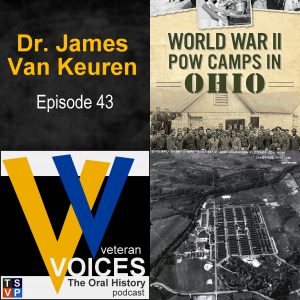
ABOUT THIS EPISODE
On episode 43 of Veteran Voices: The Oral History Podcast, we talk with James Van Keuren about his book, World War II POW Camps in Ohio. Drawing on first-person accounts from soldiers, former POWs and residents, as well as archival research, Dr. Van Keuren delves into the neglected history of Ohio’s POW camps.
During the 1940s, more than six thousand prisoners of war resided at nine camps in Ohio. The Italian POWs arrived first, charming “the locals with their affable, easygoing natures, while their German successors often put on a serious, intractable front.”
Some local residents fondly recall working alongside the prisoners and reuniting with them later in life. Others held the prisoners in disdain, feeling that they were coddled while natives struggled with day-to-day needs.

This podcast episode was recorded March 24, 2020 in Beaver Falls, Pennsylvania. Host: Kevin Farkas. Guest: James Van Keuren. Audiography: Kevin Farkas/The Social Voice Project. Music (available on SoundCloud.com): Raccoon Uniforms (“Silver Linings”), Amoebacrew (“Light Indie Rock”), Gianpiero Lupoli (“Rebirth”). Addition audio (available on YouTube.com): Texas Historical Commission (“Nazi POW Camp in Texas”), TheTigerNextDoor (“Italian prisoners of war in the USA – documentary film Prisoners in Paradise”), OTIS! (“WHY YOU’RE STUPID TO NOT STUDY HISTORY”). ©Veteran Voices: The Oral History Podcast/The Social Voice Project. All rights reserved.
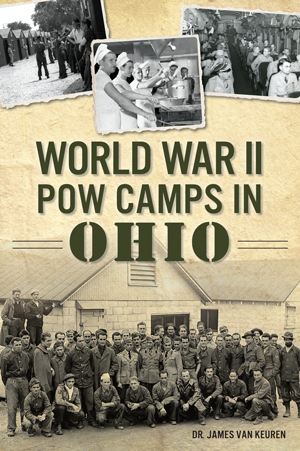
World War II POW Camps in Ohio
By Dr. James Van KeurenDuring World War II, more than six thousand prisoners of war resided at Camp Perry near Port Clinton and its branch camps at Columbus, Rossford, Cambridge, Celina, Bowling Green, Defiance, Marion, Parma and Wilmington. From the start, the camps were a study in contradictions. The Italian prisoners who arrived first charmed locals with their affable, easygoing natures, while their German successors often put on a serious, intractable front. Some local residents fondly recall working alongside the prisoners and reuniting with them later in life. Others held the prisoners in disdain, feeling that they were coddled while natives struggled with day-to-day needs. Drawing on first-person accounts from soldiers, former POWs and residents, as well as archival research, Dr. Jim Van Keuren delves into the neglected history of Ohio’s POW camps.
Dr. James Van Keuren is a retired professor of educational administration and dean of the Dwight Schar College of Education at Ashland University, as well as a former high school teacher, principal and superintendent. He has published numerous peer-reviewed articles, and his most recent book, A Tribute to the 109th Evacuation Hospital (SM), traces his father-in-law’s service during World War II. Van Keuren has been married to his wife, Pat, for forty-nine years, and they have two daughters, Michelle (Drew) Scott and Christie (Dale) Murdoch, in addition to grandchildren Hailey Scott, Weston Murdoch and Cooper Murdoch.
More Resources
 Nazi POW Camp in Texas by Texas Historical Commission
Nazi POW Camp in Texas by Texas Historical CommissionA former U.S. military prison guard and a former Nazi prisoner of war both describe their experiences at Camp Hearne during World War II. This video was produced for our heritage travel app, Texas Time Travel Tours. The mobile app features statewide thematic tours focusing on a variety of time periods and cultures in Texas history
Prisoners in Paradise by Camilla Calamandrei
During World War II more than 51,000 Italian soldiers were brought to the United States as Prisoners of War. “Prisoners in Paradise,” traces the previously untold story of these young men, their romances and friendships with American women, and their significant — but unrecognized — contribution to the Allied war effort.
ABOUT THE PODCAST
 The Veteran Voices: The Oral History Podcast features conversations with those who tell veterans’ stories in creative and interesting ways, such as oral historians, authors, poets, playwrights, and photographers. This podcast is a production of The Social Voice Project, Inc., dedicated to understanding the voices and stories of our lives through the first-hand, authentic accounts of lived experiences we call oral histories. The podcast was formerly produced by the Veteran Voices of Pittsburgh Oral History Initiative, a veteran-run, award-winning 501(c)(3) nonprofit educational organization based in Pittsburgh, Pennsylvania.
The Veteran Voices: The Oral History Podcast features conversations with those who tell veterans’ stories in creative and interesting ways, such as oral historians, authors, poets, playwrights, and photographers. This podcast is a production of The Social Voice Project, Inc., dedicated to understanding the voices and stories of our lives through the first-hand, authentic accounts of lived experiences we call oral histories. The podcast was formerly produced by the Veteran Voices of Pittsburgh Oral History Initiative, a veteran-run, award-winning 501(c)(3) nonprofit educational organization based in Pittsburgh, Pennsylvania.Host Kevin Farkas is a US Navy veteran and independent multimedia producer specializing in creative sound design and audio engineering. He has produced several audiobooks, radio dramas, live storytelling events, a podcast network, videos, as well as print and digital media publications.
OTHER WAYS TO FIND THE PODCAST






SUPPORT LOCAL HISTORY
Let’s keep local history alive for future generations! If you like our podcast, please help us continue this great educational program–for today and tomorrow. Show your support by making a financial donation, underwriting the podcast, or advertising your business or service on the show.
 27 March 2020, 6:12 pm
27 March 2020, 6:12 pm - 23 minutes 28 secondsVeteran Voices Podcast (Ep 42): Stefano Ballini
Stefano Ballini
The Red Trickle of the Soul
READ THE TRANSCRIPTION BELOW

ABOUT THIS EPISODE
On episode 42 of Veteran Voices: The Oral History Podcast, we talk with Italian filmmaker Stefano Ballini about preserving veterans stories, the moral injury of war, and his most recent documentary, The Red Trickle of the Soul–featuring Pittsburgh area veterans of WWII, Cold War, and Vietnam War.
This podcast episode was recorded June 26, 2019 in Pittsburgh, Pennsylvania. Host: Kevin Farkas. Guest: Stefano Ballini. Audiography: Kevin Farkas/The Social Voice Project. Music (available on SoundCloud.com): Amoebacrew (“Light Indie Rock”), Gianpiero Lupoli (“Rebirth”), Kevin MacLeod (“Ambiment”). Additional Audio (available on The Social Voice Project): The Social Voice Project (Alle-Kiski Chronicle (Ep08) – Stefano Ballini | Monte Sole Landing Memories”). Addition audio (available on YouTube.com): Stefano Ballini (“Trailer – Il Rivolo Rosso dell’Anima – The Red Trickle of the Soul”). TheLBJLibrary (“The Vietnam War Summit: One, Two, Three: What Are We Fighting For?”). ©Veteran Voices: The Oral History Podcast/The Social Voice Project, Inc. All rights reserved.
Veteran Voices: The Oral History Podcast (Ep42)
Stefano Ballini – The Red Trickle of the Soul
TRANSCRIPTION
ED BLANK: Was, and am, extremely proud of my military service.
GEORGE HAUGHT: Within the first twelve hours I saw more death and destruction than most people would in a lifetime.
AL DEFAZIO: I come from a little town called, Altavilla Irpina, in the province of Avellino.
STEFANO BALLINI: This is Stefano Ballini and are you are listening to the Veteran Voices History Podcast.
CAROLE ZIPPY BRENNAN: When my dad and I were alone, he told different stories. He told about the only regret he ever had—the regret of the boy who died in his arms. Both of them just kids, nineteen years old. And when my dad told me that story about not being able to get the address and the names of that young man, he said to me, “I just wanted them to know that their son died in the arms of a fellow soldier. He didn’t die out on the battle field. He didn’t die in a muddy trench.” And my dad, at ninety-one, started to cry. He remembered all of those stories. And we have to remember the stories of all the men who fought. Stefano, there are not enough words to say thank you for keeping the memory of Frank [Gervasi], and Michael [Vernillo], and my dad [Vittorio Zippi], and my uncle [Lou], and countless others—you’re keeping them alive. You are a witness. Thank you, Stefano. You are a witness.
ANNOUNCER: You are listening to a production of The Social Voice Podcast Network.
KEVIN FARKAS (PODCAST HOST): We have a very special guest today from Italy. His name is Stefano Bellini. He’s a filmmaker and documentarian specializing in veterans’ stories. And Stefano is here in the United States, he’s here in Pittsburgh, to show his English version of his latest film, The Red Trickle of the Soul. Welcome Stefano, to Pittsburgh.
STEFANO BALLINI: Thank you, thank you.
This is your second time here?
Yes.
Very exciting?
Yes.
You love Pittsburgh. [laughter]
Yes, I love Pittsburgh. I love it so much. [laughter]
Your film, The Red Trickle of the Soul, is your second documentary film.
Yes.
Before we get into talking about your film, tell us a little bit about your background, what you do in Italy, and your interest in filmmaking.
Yes, I started about 8 years ago with the first film called, Il Treno che Bucò il Fronte. In English, The Train Through the Warfront. It is the story of my father who embarked in Anzio with the allies in 1944. That is was the first film and it was very successful. The President of the Italian Republic, Giorgio Napolitano, invited me to Rome for the “Day of Remembrance.” After that people became interested in my work and what I did, so I also had to make other films. The last film, The Red Trickle of the Soul is the second film about veterans, not only of the WWII but also of the Vietnam War.
Your last film featured veterans from Pittsburgh: Frank Gervasi, Vittorio Zippy, Michael Vernillo. Pittsburgh area WWII veterans. This film, The Red Trickle of the Soul, has veterans from Vietnam, World War II, and the Cold War. You have Ed Blank, Vietnam War. Harry VanRiper, also Vietnam. Al DeFazio who is a WWII veteran, who fought in Italy, crossed the Rapido River. And you also have Ben Wright who was in Vietnam but also the Cold War as a pilot. Why did you choose these veterans for your film?
This is a very different film from the others because Monte Sole Landing Memories was a story, a story of friendship, war and hope for the future, in which the knowledge of war brings a better future. This film is different because it looks inside people’s souls and not just at events.
At Carnegie Library in Pittsburgh you have your debut of your film. Are you excited about that?
Yes.
What is the central meaning of your film?
For me it’s a test, a test because I want to talk about the WWII and the Vietnam War even if they are very different wars. I look within the soul of the those suffering most of all.
Have you shown your film to audiences and Italy?
Yes.
What is their reaction?
The reactions are very different.
Very diverse.
Very different because the message of the film is more difficult than usual. Sometimes people do not understand because they think that I put the Second World War on the same level as the Vietnam War. I only look at the effects of war on each person.
Each person.
Every person. Many do not want to understand the message. Young people and schools immediately understand the film, but older people do not understand it.
Young people, do they understand?
Yes.
This is your second film. How did you learn how to make film?
I learned that . . . war is the last of the possible solutions because it always affects every person, which is part of suffering or aggression. Every person in war is strongly affected negatively in the mind.
Did you teach yourself how to make film?
Yes, yes.
Audio?
Sound.
Edits?
And edits.
Everything.
Because it doesn’t cost much, all my films are without profit, without Euros, without money!
But you don’t make the film for money. You make the film because you believe . . .
. . . for the free knowledge.
. . . in the knowledge and the subject, and you want to share these stories, veteran stories, with the public.
All my films can be viewed online for free on the internet–YouTube and Vimeo.
So you put them free online so the whole world can watch. Do you know how many people from different countries have watched your films?
I have three films translated into English, the first, The Train Through the Warfront, then Monte Sole Landing Memories, and now The Red Trickle of the Soul. All the other films and interviews are in Italian, all my films featuring veterans are translated into English to be seen by more people.
Do you have another film that you want to make?
I do not know. I don’t know at the moment.
Films are a lot of work. A lot of effort, lots of time.
Yes.
So, nothing next?
Not at the moment, but I like talking about stories and non-Italian people. The last two videos are with veterans, I like to talk about war from other points of view, not just in Italian.
Not only in Italian.
I like to bring to Italians stories from around the world. This film is in two parts, the first speaks of the Second World War, the war suffering in the concentration camp of Auschwitz, of an Italian partisan together with the allies in Italy in ’44, war suffering by the survivors of the German massacres in Italy, and it also speaks of Albert DeFazio, sent to Italy near his family home, from where he had emigrated. The second part of the film is completely different. In this half of the film I say, now we talk about war differently! The Vietnam War begins and there is, in addition to the Pittsburgh veterans, an Oregon veteran of Italian descent who made a military career in the United States. He was in Vietnam and other places. At the beginning of the film there is a criminologist specializing in assistance to the victims of war and anti-terrorism. At the beginning of the film she explains the effects of war on people’s minds.
Today you are going to see a WWII exhibit on Normandy at Soldiers & Sailors Memorial Hall here in Pittsburgh. A few years ago, you and your son Vanni went to Normandy. Tell me about that. What was your reaction when you were there at the beach, and the cemetery? What was your reaction?
Normandy is one of the most beautiful places I have ever seen, as the beach is beautiful, very symbolic, very beautiful and sad. When we arrived at the beach we were very silent. The cemeteries are very large. We visited two cemeteries, the one at Omaha Beach and the other in Brittany, where Michael Vernillo’s friend [his lieutenant] is buried. He is buried in Brittany because he died at the end of July 44, killed by a German sniper.
I remember Michael asked you, when you visit, to find his lieutenant.
Yes, yes.
In Italy, do people want to know these veterans’ stories? Do they want to hear World War II stories, Vietnam stories, Iraq War stories? Do they want to know these stories?
For the Normandy landing, boys are very interested because they saw Spielberg’s film . . .
. . . Saving Private Ryan.
All those who have seen the film are interested in Vietnam. Many people are intrigued because the war on television and in the movies is very different from what I show.
Al DeFazio fought in Italy. Salerno, Monte Cassino, Rapido River. There are no films about that fight. Why are there no films?
In Italy there are not many films that talk about war because the war has divided the population into two. Before the war there was a dictatorship, fascism. After the war everyone was no longer fascist, but antifascist. Many people changed from one day to another, but in reality they are the same. So the political thought of people is divided and it is not easy to make a [war] film. There are not many war films made by Italians.
You could make that film. You . . .
I? [laughter]
[laughter] You could make the Rapido River, and yeah you could make that film.
Yes … it takes a lot of money for movies but no finance in Italy.
No money.
No.
No money.
No one has money.
You are from Florence?
Yes.
And you are a winemaker? Vino.
Wine?
Vino maker.
Ah, no, no, no. I like wine, but I don’t make it.
No? No Chianti?
No, I went to school for wine production, but I do not make it.
You don’t make it.
No, no, no.
You drink it?
Yes, very [laughter]
When I come to visit you, you’re going to show me bene vino, good vino?
Of course, I know Chianti Classico well.
Oh, yo amore. Okay one question. Why is it important for us to continue to hear veterans’ stories . . . to listen, to understand veteran stories? Why is it important?
Who does not make war does not understand it; only those who make war understand. There is a lady from Bologna who once said, “Se ogni persona al mondo vivesse 5 minuti di guerra, al mondo non ci sarebbero più guerre!”
Five minutes.
Five minutes. The message is this, ok, in English: if every person in the world lived just five minutes of war, then there would be no more wars.
[Closing: Peter Yarrow at “The Vietnam War Summit: One, Two, Three: What Are We Fighting For?”]
ABOUT THE PODCAST
 The Veteran Voices: The Oral History Podcast features conversations with those who tell veterans’ stories in creative and interesting ways, such as oral historians, authors, poets, playwrights, and photographers. This podcast is a production of The Social Voice Project, Inc., dedicated to understanding the voices and stories of our lives through the first-hand, authentic accounts of lived experiences we call oral histories. The podcast was formerly produced by the Veteran Voices of Pittsburgh Oral History Initiative, a veteran-run, award-winning 501(c)(3) nonprofit educational organization based in Pittsburgh, Pennsylvania.
The Veteran Voices: The Oral History Podcast features conversations with those who tell veterans’ stories in creative and interesting ways, such as oral historians, authors, poets, playwrights, and photographers. This podcast is a production of The Social Voice Project, Inc., dedicated to understanding the voices and stories of our lives through the first-hand, authentic accounts of lived experiences we call oral histories. The podcast was formerly produced by the Veteran Voices of Pittsburgh Oral History Initiative, a veteran-run, award-winning 501(c)(3) nonprofit educational organization based in Pittsburgh, Pennsylvania.Host Kevin Farkas is a US Navy veteran and independent multimedia producer specializing in creative sound design and audio engineering. He has produced several audiobooks, radio dramas, live storytelling events, a podcast network, videos, as well as print and digital media publications.
OTHER WAYS TO FIND THE PODCAST






SUPPORT LOCAL HISTORY
Let’s keep local history alive for future generations! If you like our podcast, please help us continue this great educational program–for today and tomorrow. Show your support by making a financial donation, underwriting the podcast, or advertising your business or service on the show.
 9 September 2019, 4:14 pm
9 September 2019, 4:14 pm - 52 minutes 45 secondsVeteran Voices: The Oral History Podcast – Episode 18
Daniel M. Cohen | Single-Handed
The inspiring true story of Tibor “Teddy” Rubin

ABOUT THIS EPISODE
On Episode 18 of Veteran Voices: The Oral History Podcast, we talk with Daniel M. Cohen, filmmaker and author of Single-Handed, the inspiring true story of Tibor “Teddy” Rubin–Holocaust survivor, Korean War hero and Medal of Honor recipient.
This podcast episode was recorded August 9, 2015 in Pittsburgh, Pennsylvania. Host: Kevin Farkas. Guest: Daniel M. Cohen. Audiography: Kevin Farkas. Music available on Soundcloud.com: Moist Appointment (Is It Really So Surprising), SNX (Shooting Stars), Sergey Pismennyy (Transition), Marcel du Preez (Firepower). ©Veteran Voices: The Oral History Podcast/The Social Voice Project, Inc. All rights reserved.
ABOUT THE PODCAST
 The Veteran Voices: The Oral History Podcast features conversations with those who tell veterans’ stories in creative and interesting ways, such as oral historians, authors, poets, playwrights, and photographers. This podcast is a production of The Social Voice Project, Inc., dedicated to understanding the voices and stories of our lives through the first-hand, authentic accounts of lived experiences we call oral histories. The podcast was formerly produced by the Veteran Voices of Pittsburgh Oral History Initiative, a veteran-run, award-winning 501(c)(3) nonprofit educational organization based in Pittsburgh, Pennsylvania.
The Veteran Voices: The Oral History Podcast features conversations with those who tell veterans’ stories in creative and interesting ways, such as oral historians, authors, poets, playwrights, and photographers. This podcast is a production of The Social Voice Project, Inc., dedicated to understanding the voices and stories of our lives through the first-hand, authentic accounts of lived experiences we call oral histories. The podcast was formerly produced by the Veteran Voices of Pittsburgh Oral History Initiative, a veteran-run, award-winning 501(c)(3) nonprofit educational organization based in Pittsburgh, Pennsylvania.Host Kevin Farkas is a US Navy veteran and independent multimedia producer specializing in creative sound design and audio engineering. He has produced several audiobooks, radio dramas, live storytelling events, a podcast network, videos, as well as print and digital media publications.
OTHER WAYS TO FIND THE PODCAST






SUPPORT LOCAL HISTORY
Let’s keep local history alive for future generations! If you like our podcast, please help us continue this great educational program–for today and tomorrow. Show your support by making a financial donation, underwriting the podcast, or advertising your business or service on the show.
 19 August 2019, 11:29 pm
19 August 2019, 11:29 pm - 37 minutes 42 secondsVeteran Voices Podcast (Ep 41): Mike Lombardi
Mike Lombardi | It Was Hard
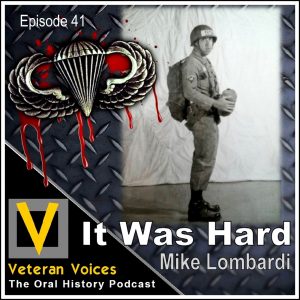
ABOUT THIS EPISODE
On Episode 41 of Veteran Voices: The Oral History Podcast, we talk about vicarious storytelling. After veterans are gone, who will tell their stories? Our guest is army airborne veteran of the Cold War, Mike Lombardi, who shares the story of his father, Master Sergeant Archie Lombardi.
This podcast episode was recorded October 2, 2018 in Beaver Falls, Pennsylvania. Host: Kevin Farkas. Guest: Mike Lombardi. Audiography: Kevin Farkas/The Social Voice Project, Inc. Music (available on SoundCloud.com): Floxyde (“Misery,” “Hypnosis,” “Bada01”). Addition audio (available on YouTube.com): OakRidgejet (“JFK – Remarks at West Point to the Graduating Class of the U.S. Military Academy, June 6, 1962”), Việt Tráng Sĩ (“Green Berets Original Soundtrack Written By Miklós Rózsa”). ©Veteran Voices: The Oral History Podcast/The Social Voice Project, Inc. All rights reserved.
ABOUT THE PODCAST
 The Veteran Voices: The Oral History Podcast features conversations with those who tell veterans’ stories in creative and interesting ways, such as oral historians, authors, poets, playwrights, and photographers. This podcast is a production of The Social Voice Project, Inc., dedicated to understanding the voices and stories of our lives through the first-hand, authentic accounts of lived experiences we call oral histories. The podcast was formerly produced by the Veteran Voices of Pittsburgh Oral History Initiative, a veteran-run, award-winning 501(c)(3) nonprofit educational organization based in Pittsburgh, Pennsylvania.
The Veteran Voices: The Oral History Podcast features conversations with those who tell veterans’ stories in creative and interesting ways, such as oral historians, authors, poets, playwrights, and photographers. This podcast is a production of The Social Voice Project, Inc., dedicated to understanding the voices and stories of our lives through the first-hand, authentic accounts of lived experiences we call oral histories. The podcast was formerly produced by the Veteran Voices of Pittsburgh Oral History Initiative, a veteran-run, award-winning 501(c)(3) nonprofit educational organization based in Pittsburgh, Pennsylvania.Host Kevin Farkas is a US Navy veteran and independent multimedia producer specializing in creative sound design and audio engineering. He has produced several audiobooks, radio dramas, live storytelling events, a podcast network, videos, as well as print and digital media publications.
OTHER WAYS TO FIND THE PODCAST






SUPPORT LOCAL HISTORY
Let’s keep local history alive for future generations! If you like our podcast, please help us continue this great educational program–for today and tomorrow. Show your support by making a financial donation, underwriting the podcast, or advertising your business or service on the show.
 3 October 2018, 3:33 pm
3 October 2018, 3:33 pm - 37 minutes 27 secondsVeteran Voices Podcast (Ep 40): Nick Grimes
Nick Grimes | Tell Me a Story
(This episode contains explicit language or subject matter)
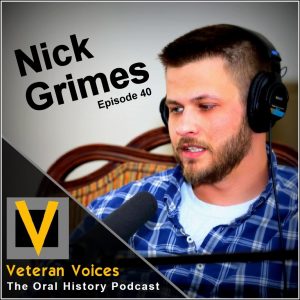
ABOUT THIS EPISODE
On Episode 40 of Veteran Voices: The Oral History Podcast, we talk with Nick Grimes, army veteran of Afghanistan and director of the Veterans Breakfast Club’s Post-9/11 Veterans Storytelling Project, about what defines a Post-9/11 era veteran, live storytelling events, the truth in oral history, and how best to thank today’s veterans.
This episode was recorded April 9, 2017 in Homestead, Pa. Host: Kevin Farkas. Guest: Nick Grimes. Audiography: Kevin Farkas, Bryan Chemini. Music (available at Soundcloud.com): David Hyde (“21st Aug 3”), les.wray (“Pretty Surfer Girl Just Rode Off on Her Motorbikel”), hxppy (“Rock1”). Additional audio (available on YouTube.com): The Orchard Music (Frankie Lane and Jimmy Boyd – “Tell Me a Story”). ©Veteran Voices: The Oral History Podcast/The Social Voice Project, Inc. All rights reserved.
ABOUT THE PODCAST
 The Veteran Voices: The Oral History Podcast features conversations with those who tell veterans’ stories in creative and interesting ways, such as oral historians, authors, poets, playwrights, and photographers. This podcast is a production of The Social Voice Project, Inc., dedicated to understanding the voices and stories of our lives through the first-hand, authentic accounts of lived experiences we call oral histories. The podcast was formerly produced by the Veteran Voices of Pittsburgh Oral History Initiative, a veteran-run, award-winning 501(c)(3) nonprofit educational organization based in Pittsburgh, Pennsylvania.
The Veteran Voices: The Oral History Podcast features conversations with those who tell veterans’ stories in creative and interesting ways, such as oral historians, authors, poets, playwrights, and photographers. This podcast is a production of The Social Voice Project, Inc., dedicated to understanding the voices and stories of our lives through the first-hand, authentic accounts of lived experiences we call oral histories. The podcast was formerly produced by the Veteran Voices of Pittsburgh Oral History Initiative, a veteran-run, award-winning 501(c)(3) nonprofit educational organization based in Pittsburgh, Pennsylvania.Host Kevin Farkas is a US Navy veteran and independent multimedia producer specializing in creative sound design and audio engineering. He has produced several audiobooks, radio dramas, live storytelling events, a podcast network, videos, as well as print and digital media publications.
OTHER WAYS TO FIND THE PODCAST






SUPPORT LOCAL HISTORY
Let’s keep local history alive for future generations! If you like our podcast, please help us continue this great educational program–for today and tomorrow. Show your support by making a financial donation, underwriting the podcast, or advertising your business or service on the show.
 18 June 2018, 2:19 am
18 June 2018, 2:19 am - 36 minutes 47 secondsVeteran Voices Podcast (Ep 39): Teresa Funke
Teresa Funke
Historical Fiction

ABOUT THIS EPISODE
On Episode 39 of Veteran Voices: The Oral History Podcast, we talk with author Teresa Funke about historical fiction, oral history, the art of conversation, and why it matters more than ever to preserve the stories of the WWII generation.
Teresa Funke is an award-winning author of numerous books based on true-life stories from the WWII era. She is the owner of Teresa Funke & Company and Victory House Press. She is also a nationwide speaker offering keynotes and presentations and a popular writer’s coach.
This episode was recorded September 26, 2017. Host: Kevin Farkas. Guest: Teresa Funke. Audiography: Kevin Farkas. Music (available at Soundcloud.com): Dave Delightman (“A Whisper Across the Sand”), Spiffy Man (“Farewell, ft. Progley”), Sweetwave Audio (“Free Ambient Loop”). ©Veteran Voices: The Oral History Podcast/The Social Voice Project, Inc. All rights reserved.
ABOUT THE PODCAST
 The Veteran Voices: The Oral History Podcast features conversations with those who tell veterans’ stories in creative and interesting ways, such as oral historians, authors, poets, playwrights, and photographers. This podcast is a production of The Social Voice Project, Inc., dedicated to understanding the voices and stories of our lives through the first-hand, authentic accounts of lived experiences we call oral histories. The podcast was formerly produced by the Veteran Voices of Pittsburgh Oral History Initiative, a veteran-run, award-winning 501(c)(3) nonprofit educational organization based in Pittsburgh, Pennsylvania.
The Veteran Voices: The Oral History Podcast features conversations with those who tell veterans’ stories in creative and interesting ways, such as oral historians, authors, poets, playwrights, and photographers. This podcast is a production of The Social Voice Project, Inc., dedicated to understanding the voices and stories of our lives through the first-hand, authentic accounts of lived experiences we call oral histories. The podcast was formerly produced by the Veteran Voices of Pittsburgh Oral History Initiative, a veteran-run, award-winning 501(c)(3) nonprofit educational organization based in Pittsburgh, Pennsylvania.Host Kevin Farkas is a US Navy veteran and independent multimedia producer specializing in creative sound design and audio engineering. He has produced several audiobooks, radio dramas, live storytelling events, a podcast network, videos, as well as print and digital media publications.
OTHER WAYS TO FIND THE PODCAST





SUPPORT LOCAL HISTORY
Let’s keep local history alive for future generations! If you like our podcast, please help us continue this great educational program–for today and tomorrow. Show your support by making a financial donation, underwriting the podcast, or advertising your business or service on the show.
 10 October 2017, 12:46 pm
10 October 2017, 12:46 pm - 36 minutes 56 secondsVeteran Voices: The Oral History Podcast – Episode 38 – Bob Dvorchak
Bob Dvorchak | Drive On
On Episode 38 of Veteran Voices: The Oral History Podcast, we talk with Bob Dvorchak, legendary Pittsburgh sports writer, national journalist, war correspondent, and author of Drive On: The Uncensored War of Bedouin Bob and the All-Americans.

Bob Dvorchak is an award-winning author and journalist, whose career spans more than four decades from Associated Press national correspondent to the Pittsburgh Post-Gazette. In his forties, he was asked by AP to cover the Gulf War (1990-91) and embedded with US armed forces deployed to Kuwait and Saudi Arabia. His latest book, Drive On: The Uncensored War of Bedouin Bob and the All-Americans, is a personal and historical reflection upon his life as a journalist, war correspondent, and the soldiers of the famed 82nd Airborne Infantry he came to know as “brothers” during the war.
This episode was recorded in Bethel Park, Pennsylvania. It is a production of The Social Voice Podcast Network. Executive Producer and Host: Kevin Farkas. Audiography: Kevin Farkas. Music (available at Soundcloud.com): Unknown (“Bkgrdloop”), STC Beats (“Reverb”), Pipe Choir Records (“Ancient Whispers”), Dave Delightman (“A Whisper Across the Sand”). Additional sound (available at Youtube.com): Saeed Vahedikamal (“George Carlin- Persian Gulf War”), Keith Hughes (“The Persian Gulf War Explained: US History Review”), Jabzy (“First Gulf War | 3 Minute History”), Richard Hogan (“The Gulf War 1991”), WPSU (“Joseph Galloway: Life of a War Correspondent – Conversations from Penn State”). ©Veteran Voices: The Oral History Podcast/The Social Voice Project, Inc. All rights reserved.
OTHER WAYS TO FIND THE PODCAST





SUPPORT LOCAL HISTORY
Let’s keep local history alive for future generations! If you like our podcast, please help us continue this great educational program–for today and tomorrow. Show your support by making a financial donation, underwriting the podcast, or advertising your business or service on the show.
 3 May 2017, 1:17 pm
3 May 2017, 1:17 pm - 28 minutes 27 secondsVeteran Voices: The Oral History Podcast – Episode 37
Eric Rood | Veteran Aviator Oral Histories
On Episode 37 of Veteran Voices: The Oral History Podcast, we talk about recording veterans oral histories in the world of aviation with Eric Rood of the Experimental Aircraft Association’s Timeless Voices of Aviation project.
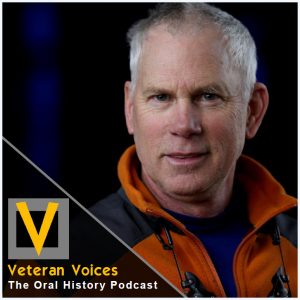 Eric Rood of Columbus, Ohio has been capturing, preserving, and sharing veterans’ stories since 2006. In addition to recording locally, each year Eric travels to the Experimental Aviation Association’s annual convention in Oshkosh, Wisconsin to interview veteran aviators—on the fly, so to speak.
Eric Rood of Columbus, Ohio has been capturing, preserving, and sharing veterans’ stories since 2006. In addition to recording locally, each year Eric travels to the Experimental Aviation Association’s annual convention in Oshkosh, Wisconsin to interview veteran aviators—on the fly, so to speak.Being at Oshkosh working with EAA’s Timeless Voices of Aviation project is a wonderful experience for any oral historian or aviation enthusiast (Eric is a pilot, himself), but it is a technical challenge to record so many interviews in such a short period of time. But, he admits, preserving these stories is our obligation to history and a tribute to our veterans’ service—especially our WWII veterans.
Producer’s Note: Nick Grimes is the host of Longest War: The Post-9/11 Veterans Podcast and a combat Army veteran of Afghanistan.
This episode was recorded at the Allegheny-Kiski Valley Historical Society and Heritage Museum in Tarentum, Pennsylvania. It is a production of The Social Voice Podcast Network. Host: Kevin Farkas. Audiography: Kevin Farkas. Music (available on Soundcloud.com): John892 (“Despair”) Abbey Fiddler (“Hatchet D”), Zippo for Wisdom (“Japanese Gal Riddim”). ©Veteran Voices: The Oral History Podcast/The Social Voice Project, Inc. All rights reserved.
OTHER WAYS TO FIND THE PODCAST





SUPPORT LOCAL HISTORY
Let’s keep local history alive for future generations! If you like our podcast, please help us continue this great educational program–for today and tomorrow. Show your support by making a financial donation, underwriting the podcast, or advertising your business or service on the show.
 1 April 2017, 5:23 pm
1 April 2017, 5:23 pm - 26 minutes 4 secondsVeteran Voices: The Oral History Podcast – Episode 36
John Paul Deley | Oral History Transcriptions
On Episode 36 of Veteran Voices: The Oral History Podcast, we talk about transcribing oral history interviews with John Paul Deley, Director of the Detre Library & Archives at the Senator John Heinz History Center in Pittsburgh, Pennsylvania.
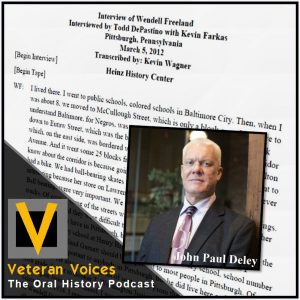
John Paul Deley is enthusiastic about preserving history. As head of the Senator John Heinz History Center’s Detre Library and Achive, his passion for saving public history is more than a job, it’s been a calling for nearly four decades.
In this episode, John Paul explains the importance of preserving oral histories through written transcripts, a particularly useful platform that not only serves scholars and historians, but also the public. The Heinz History Center’s expertise and rigorous methodology applied to producing written transcripts is unsurpassed.
This episode was recorded at the Heinz History Center in Pittsburgh, Pennsylvania. It is a production of The Social Voice Podcast Network. Host: Kevin Farkas. Audiography: Kevin Farkas. Music (available on Soundcloud.com): Codie LaLonde (“Clouds”), Zippo for Wisdom (“Japanese Gal Riddim”). ©Veteran Voices: The Oral History Podcast/The Social Voice Project, Inc. All rights reserved.
OTHER WAYS TO FIND THE PODCAST





SUPPORT LOCAL HISTORY
Let’s keep local history alive for future generations! If you like our podcast, please help us continue this great educational program–for today and tomorrow. Show your support by making a financial donation, underwriting the podcast, or advertising your business or service on the show.
 27 February 2017, 2:13 am
27 February 2017, 2:13 am - 31 minutes 54 secondsVeteran Voices: The Oral History Podcast – Episode 35Florent Plana | World War II Veterans Memories On Episode 35 of Veteran Voices: The Oral History Podcast, we talk with French historian Florent Plana as he travels the US recording the stories of WWII veterans. After finishing graduate school, French historian Florent Plana knew he wanted to do something different for awhile—something personally meaningful, of value and use. Unlike many of his fellow graduates, he didn’t want to take a year off to celebrate, recreate, loaf around, or jump straight into a dull professional job. Instead, he ventured to the United States, bought an old RV camper, and set off to meet and record the stories of WWII veterans—one chance encounter at a time. His passion for WWII and respect for those who landed upon the shores of France began when he was a child, “the day I saw the Normandy beaches for the first time,” he says, “where thousands of Allied soldiers landed and paid the ultimate sacrifice during the summer of 1944.” When Florent saw the National Cemetery of Colleville-Sur-Mer, where too many soldiers, sailors, and airmen were laid to rest after the war, he was deeply moved and honored by their sacrifice. Because of their service, Florent reminds all who listen, he and his country are free today. Florent holds more than a quiet debt of gratitude; he feels obligated to use his historical training to ensure that the experiences and stories of surviving WWII veterans—especially those who liberated France—do not vanish with time. Thus began World War II Veterans Memories, a cross-country oral history project recording, preserving, and sharing the stories of WWII veterans, wherever Florent finds them—the aisles of Walmart, a barbershop, an email from a soldier’s granddaughter, a posted to his Facebook page, or referral by a friend of a friend who knows a quiet old man down the street who, rumor has it, landed in the first wave at Normandy. These precious, first-hand stories, Florent knows, will soon be lost. So, he urgently schedules his next oral history interview, plots a course to some American city he’s never heard of, and drops his old RV into gear. This episode was recorded December 2, 2017 in Penn Hills, Pennsylvania. It is a production of The Social Voice Podcast Network. Host: Kevin Farkas. Audiography: Kevin Farkas. Music (available on Soundcloud.com): _aa_ ("Audit Columbia"), "Trance," Pipe Choir Records ("Reach Out Return"), Zippo for Wisdom ("Japanese Gal Riddim"). ©Veteran Voices: The Oral History Podcast/The Social Voice Project, Inc. All rights reserved. OTHER WAYS TO FIND THE PODCAST jQuery(document).ready(function() { jQuery('#slider_3642').owlCarousel({ responsive:{ 0:{ items:1 }, 480:{ items:2 }, 768:{ items:3 }, 980:{ items:4 }, 1200:{ items:4 }, 1500:{ items:4 } }, autoplay : true, autoplayTimeout : 5000, autoplayHoverPause : true, smartSpeed : 200, fluidSpeed : 200, autoplaySpeed : 200, navSpeed : 200, dotsSpeed : 200, loop : true, nav : true, navText : ['Previous','Next'], dots : true, responsiveRefreshRate : 200, slideBy : 1, mergeFit : true, autoHeight : false, mouseDrag : true, touchDrag : true }); jQuery('#slider_3642').css('visibility', 'visible'); sa_resize_slider_3642(); window.addEventListener('resize', sa_resize_slider_3642); function sa_resize_slider_3642() { var min_height = '50'; var win_width = jQuery(window).width(); var slider_width = jQuery('#slider_3642').width(); if (win_width < 480) { var slide_width = slider_width / 1; } else if (win_width < 768) { var slide_width = slider_width / 2; } else if (win_width < 980) { var slide_width = slider_width / 3; } else if (win_width < 1200) { var slide_width = slider_width / 4; } else if (win_width < 1500) { var slide_width = slider_width / 4; } else { var slide_width = slider_width / 4; }27 January 2017, 12:58 am
- More Episodes? Get the App
Your feedback is valuable to us. Should you encounter any bugs, glitches, lack of functionality or other problems, please email us on [email protected] or join Moon.FM Telegram Group where you can talk directly to the dev team who are happy to answer any queries.
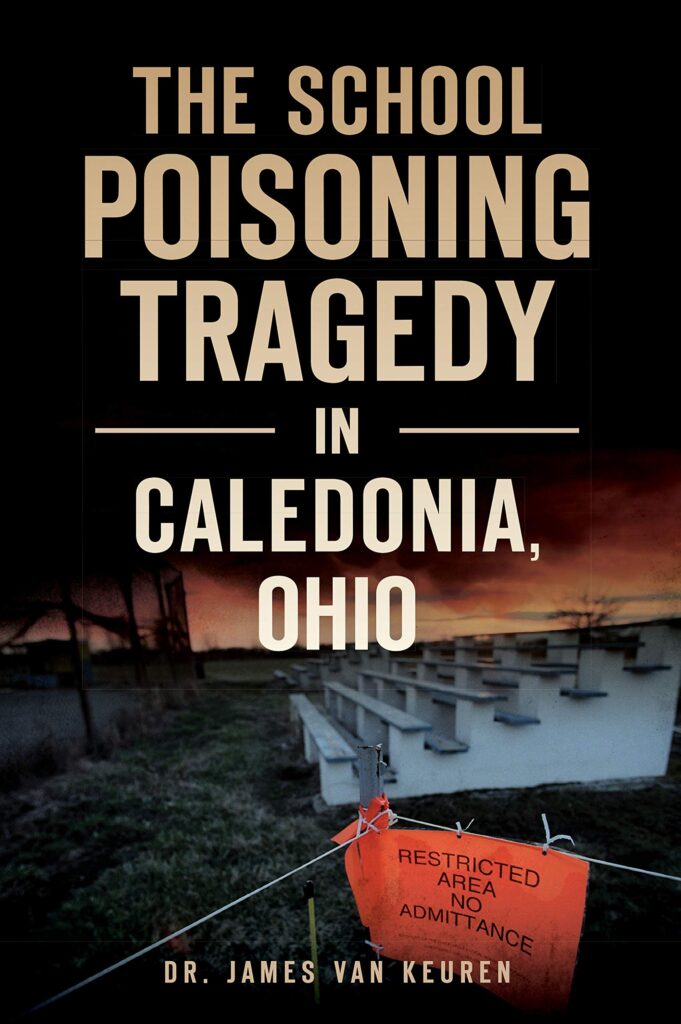


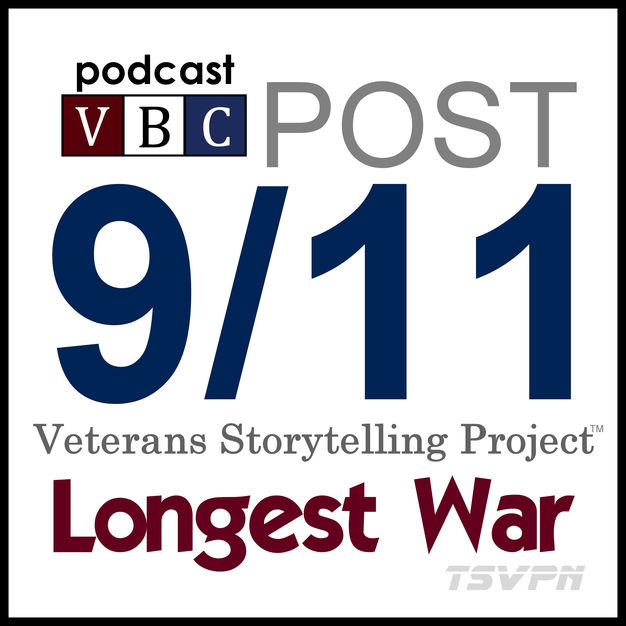 Longest War: The Post-9/11 Veterans Podcast
Longest War: The Post-9/11 Veterans Podcast
 Veterans Breakfast Club
Veterans Breakfast Club
 Borne the Battle
Borne the Battle
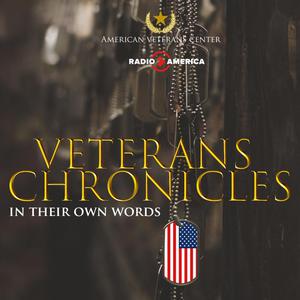 Veterans Chronicles
Veterans Chronicles
 The History Files
The History Files